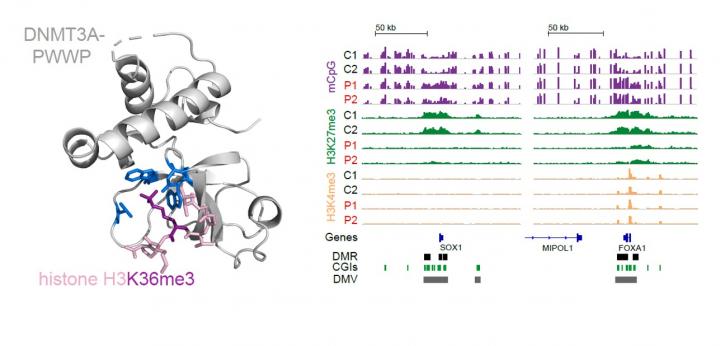Mutations in a DNA methyltransferase cause microcephalic dwarfism
Interplay between DNA methylation and Polycomb at key developmental regulators helps determine organism size in mammals: November 2018

Microcephalic dwarfism is a syndrome of extreme short stature. People with microcephalic dwarfism have proportionally reduced head and body size, distinguishing it from other types of dwarfism.
Researchers at the MRC Human Genetics Unit, led by Duncan Sproul and Andrew Jackson, have identified de novo missense mutations in the DNMT3A gene, encoding a DNA methyltransferase, that cause microcephalic dwarfism. This is of special interest, as it has been shown previously that other mutations causing a loss of DNMT3A’s function lead to overgrowth, rather than reduced size.
The new mutations reported here lead to a protein which is stable, but unable to interact correctly with chromatin, the complex of DNA and proteins that makes up chromosomes. DNA methyltransferases modify DNA by adding methyl groups. Other enzymes also modify the protein component of chromatin, particularly proteins known as histones. Together these modifications are known as epigenetic marks and act to regulate gene expression .
Individuals with these newly identified DNMT3A mutations have higher levels of DNA methylation at important developmental genes normally devoid of DNA methylation. At the same time the pattern of histone modifications at these promoters is altered. They specifically lose H3K27me3, a modification associated with the function of proteins known as Polycomb repressive complexes . Mice containing one of the mutations, showed reduced brain size and body weight, as well as increased methylation at similar regions to those observed in human patients individuals.
Previously identified genes that cause microcephalic dwarfism have been key components of the cell cycle machinery or involved in the repair of genome insults DNA damage, to ensure efficient cell proliferation. This new research suggests that the interplay between DNA methylation and Polycomb at key developmental regulators is also an important determinant of organism size in mammals.
Links
Original research article: https://doi.org/10.1038/s41588-018-0274-x


